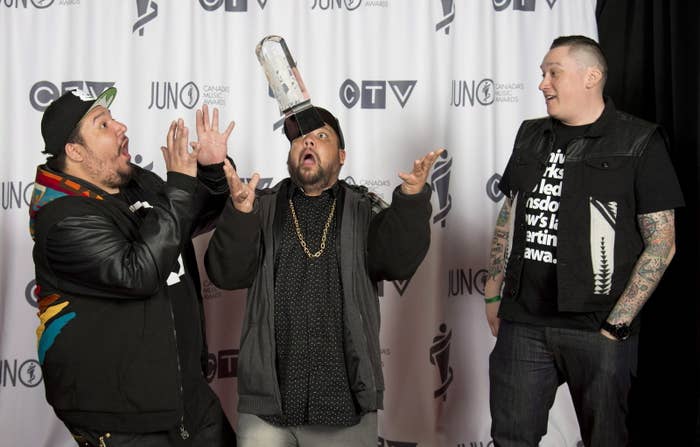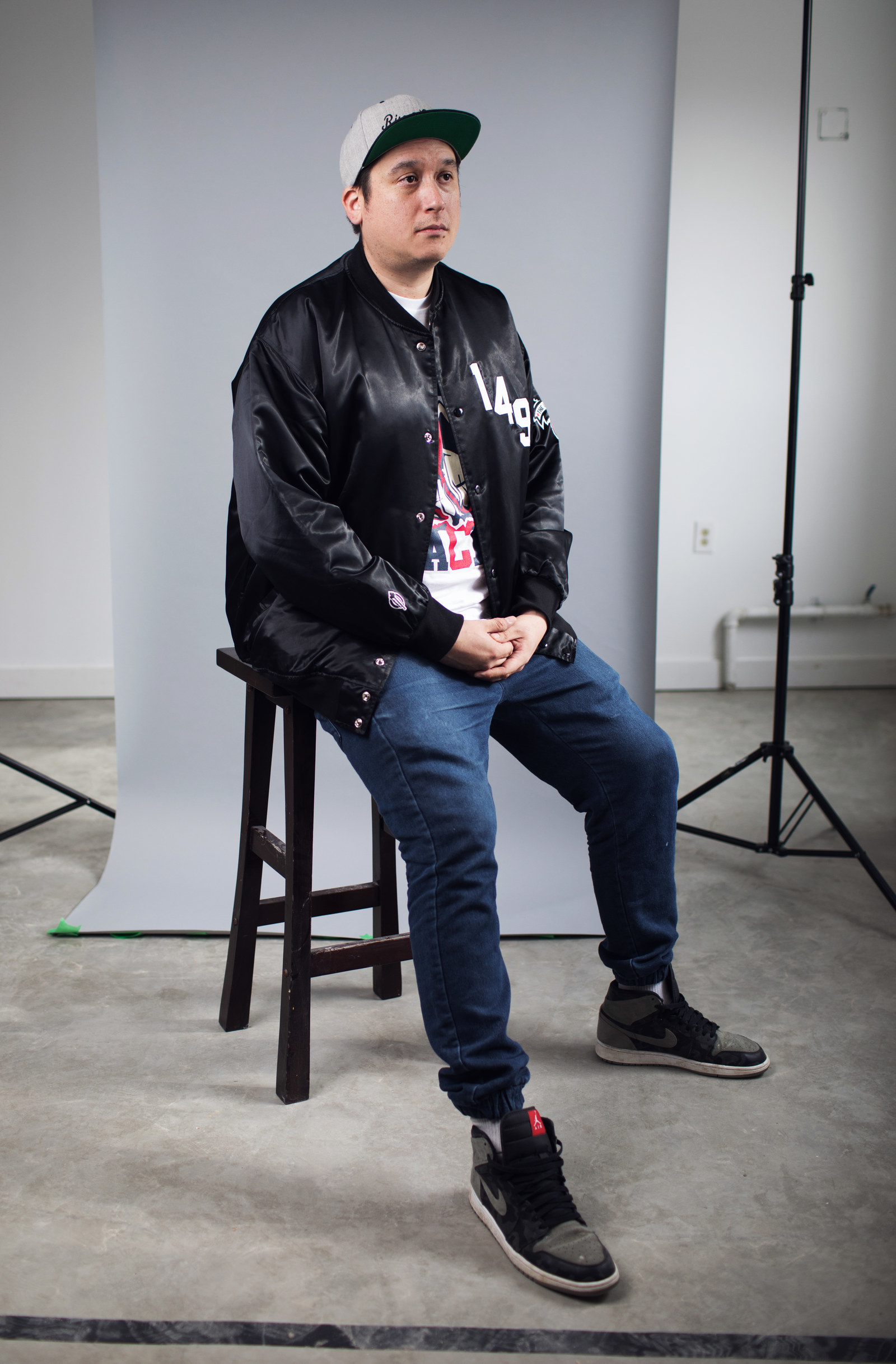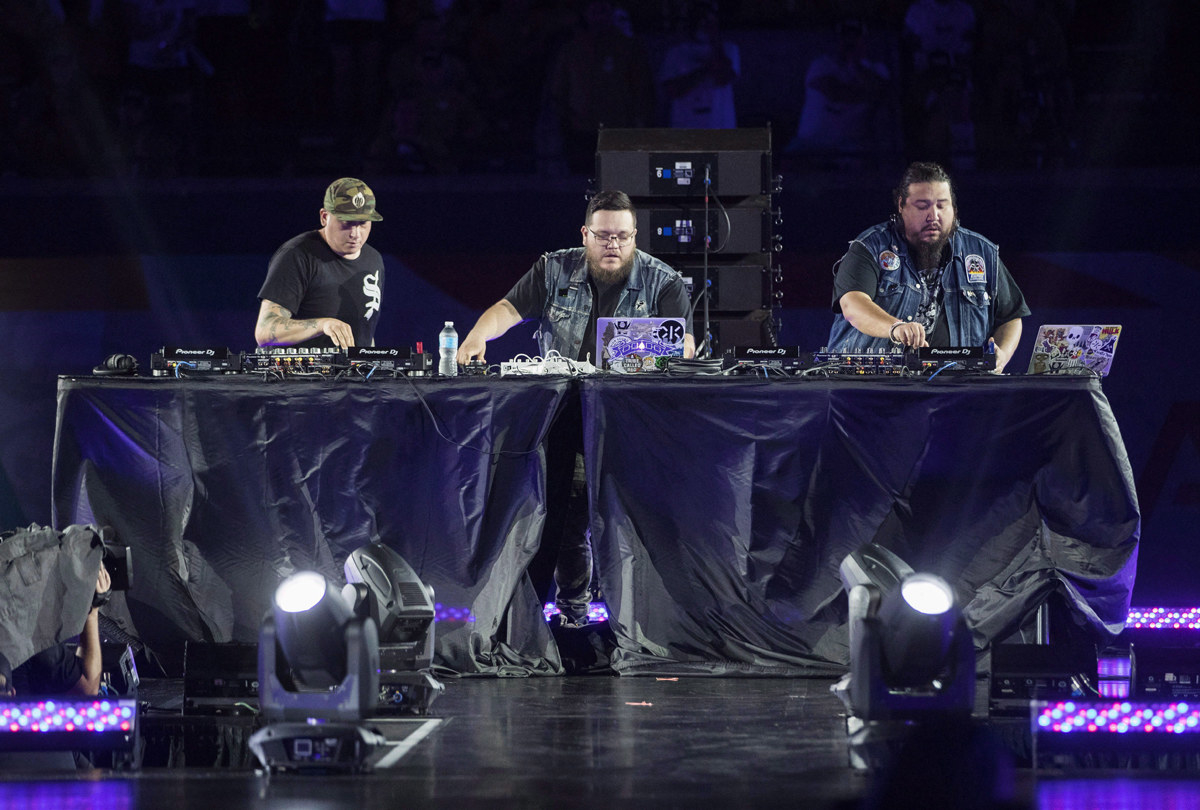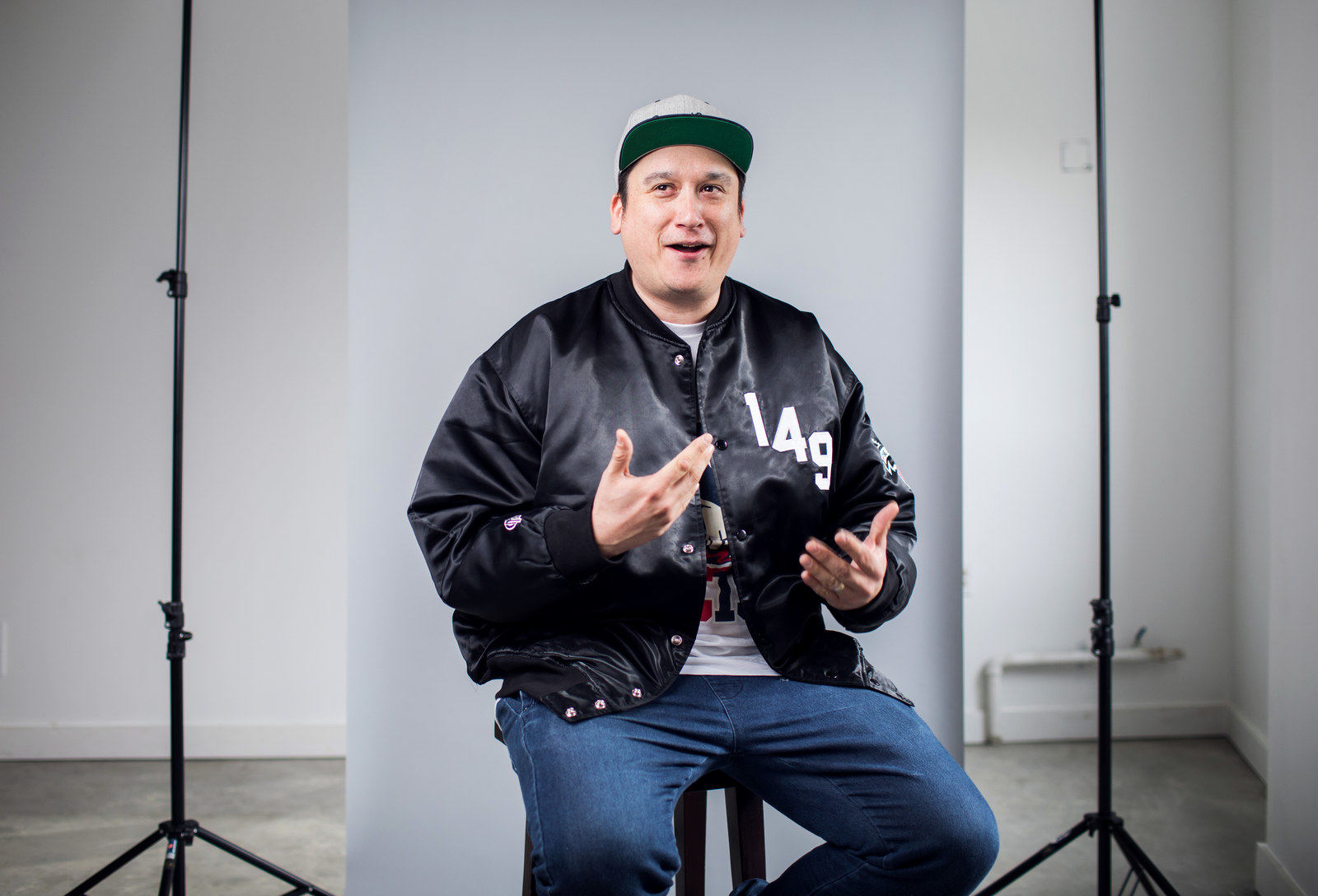
Ian Campeau can’t help but smile as he talks about the potlatch ceremony, a festival celebrated by West Coast Indigenous peoples. We’re in a studio in Toronto overlooking Dundas West, and Campeau, genial and warm in a wash of light from the windows, is praising the ceremony’s treatment of affluence. “They measured their wealth by how much they can give away,” Campeau says. The potlatch would redistribute resources among the community, levelling the field, and it’s clear that Campeau wants to share everything he’s got in the hopes of bettering the lives of others.
That’s why he had to leave A Tribe Called Red.
“It was a fucking hard decision,” Campeau sighs later, before lighting a joint, seated on a bench in Trinity Bellwoods Park. It’s been almost two weeks since Campeau, known in Tribe as DJ NDN, announced his departure from the beloved Canadian electronic group. He’s moving on from the group he cofounded in order to dedicate himself to advocacy and activism work, using his platform to continue to “bring positive things into the world.”
Of course, that’s something A Tribe Called Red has always done. The trio has spoken bluntly about colonial violence, oppression, and genocide perpetrated against Indigenous peoples, and as they’ve rocketed to become one of Canada’s most popular performing groups, their activism has spread far and wide. They won the award for Breakthrough Group of the Year at the 2014 Juno Awards, and they’ve been shortlisted for the prestigious Polaris Prize twice. Their long-running Electric Powwow at Babylon, a nightclub in Ottawa, created space in urban environments for Indigenous peoples, while their 2015 Rez Tour brought urban electronic music to First Nation stages.

They’ve challenged oppressive systems across the nation, asking that their non-Indigenous fans refrain from wearing appropriative costumes and calling out youth rec teams on their racist name. They’ve turned Canadian dance floors into a political space for education and inclusivity. But the realities of being in a touring band took their toll on Campeau.
“We [didn’t] talk about politics anymore,” he says. His bandmates preferred swapping notes on wrestling and video games, neither of which interested Campeau. For a socially charged existence like Campeau’s, the absence of spirited discourse was frustrating. “I didn’t really have much to talk to, which left me to be isolated in the van and hotel rooms,” he shrugs. “It just felt lonely, and it felt different.”
“For me to get off of touring was to benefit myself mentally."
The loneliness of touring triggered severe bouts of depression and anxiety, which made leaving the band an act of self-preservation and care. “For me to get off of touring was to benefit myself mentally,” he says. But he also noticed that when he talked about his mental health, others felt safe to do the same. “I realized the more I talked about it, the more people were not just empathetic, but also processing their own feelings. A lot of people started talking about their depression and anxiety, and it seems to be a fucking epidemic right now.” He snorts, “When we’re on the brink of fucking nuclear war, and that’s the least of our worries, of course everyone’s going to be stressed out.”
It’s immediately clear that Campeau, breathlessly earnest and optimistic, just straight-up cares about things. When Campeau speaks, it’s in an excited flurry of words and ideas. Between his time in Tribe inspiring youths (at one point, he went so far as to cut out fried food to set a better example) to his current dedication to social justice for all, one gets the sense that his is an innate generosity of spirit. Evidently, it’s been that way for a while.

He grew up in the Ottawa suburb of Orléans in a room plastered with New Kids On The Block posters, until he got into hip-hop (“A lot of Public Enemy,” he notes) and punk. His neighbour was an activist with Ottawa’s Skinheads Against Racial Prejudice (SHARPs), fighting an influx of white nationalism and racism in the early ‘90s. “He used to go and fight all the Nazi punks downtown,” Campeau recalls. That same neighbour took him to his first basement punk show (which was thrown by Campeau’s babysitter). “Being exposed to people that will literally put their body on the line to end racial prejudice is definitely something that I looked up to.”
Another critical shift came by way of Winnipeg punk outfit Propagandhi. Campeau was a 15-year-old, self-assigned “skatepunk” when they released Less Talk, More Rock in 1996. “That album probably influenced me more than any other record,” he says. Lining the edges of the album artwork are a stream of declarations: “ANTI-FASCIST. GAY-POSITIVE. PRO-FEMINIST.” They were foreign concepts to a young Campeau, who was conditioned, like virtually all young men, to accept hetero-male supremacy and that structure’s subjugation of other identities. “It really confronted what I understood: how to be, how to act. It really struck a chord on how…” He pauses. “I was looking at things wrong, and I understood the power structure of things wrong.”
Unlearning those power structures is something Campeau started long ago. Now, he’s committed himself to reprogramming the harmful socialization that made those declarations seem radical in the first place. Campeau acknowledges that he’s in a position of privilege, so he wants to use that position to lift others up. He’s spending his time speaking against institutionalized misogyny, racism, and more, focusing his energy toward things like starting a podcast with Canadian rapper Shad to address toxic masculinity and speaking directly with Canada’s legislators to spur change. He sees it as “spreading his wealth” in ways he couldn’t with Tribe. “Pretending to be happy, jumping onstage for an hour, wouldn’t get me that access as quickly as I would having these talks with these people face to face.” He adds proudly, “I feel that I’m doing way more meaningful work.”
“I changed my dynamic in Tribe. I quit drinking. I quit a lot of bullshit that I was doing when I realized, ‘Okay, kids are looking at me.'"
As Canada inches toward legalized marijuana, one of Campeau’s main projects is advocating for sound cannabis legislation. His relationship with cannabis runs deep: When his wife was recovering from cancer, he started using it to calm himself on nights off, and during a painful healing process after a mastectomy, his wife tried it to manage her discomfort. Campeau explains cannabis allowed her to move her shoulder free of pain. “It was a miracle. That’s when I was like, ‘Fuck, you can’t tell me this isn’t a medicine.’ This isn’t just something that makes us feel nice. This is my wife’s cancer medication.” Now, he’s an ambassador for cannabis lifestyle brand Leafly, hoping the platform will allow him to shape public policy so others can benefit from marijuana.
He’s also using his cannabis advocacy as a forum to intersect dialogues. For example, when Campeau throws “weed parties” at vape lounges in Toronto, he configures them as fundraisers for shelters like Women’s Habitat and activists like harm-reduction worker Zoe Dodd. It’s another space to inform and, hopefully, reform. “Through cannabis, it’s opening a lot of ways to confront violence against women and Indigenous issues,” he explains. “We can talk about police state, and how cannabis is seen on Indigenous people versus non-Indigenous people. It opens up a lot of talk to confront oppression that we see.”
Campeau is aware that there’s another dimension to his new endeavours: He’s an icon of endless possibility for Indigenous youths across the country. He says when he realized he could be a role model, “I changed my dynamic in Tribe. I quit drinking. I quit a lot of bullshit that I was doing when I realized, ‘Okay, kids are looking at me.’”

That was a contributing factor behind Tribe’s Rez Tour, for which they visited First Nations reserves across Ontario. Despite knowing crowds would be smaller, they didn’t pare down the show; they brought the same stage they’d use in downtown Ottawa. “We wanted to give these kids the same show,” he says. “Seeing three Indigenous dudes jump around and press buttons on some record players could inspire [kids] to do that too. Once they see you onstage doing it, they’ll know that they can do it. You just have to be able to see it.”
Campeau knows how critical that visibility is, which is why he’s extrapolating it to other spheres. “I have friends who have kids who said that they wanna grow up to make people happy like A Tribe Called Red,” he says. He wipes away tears, chuckling that he still cries over that story. It’s a brief anecdote, but it’s important: Seeing your reality affirmed, and seeing your identity reflected at soaring heights, is vital.

Campeau notes that even though his days with Tribe are over, he hasn’t given it up for good. “I’m not saying I’m gonna quit music,” he laughs. “I just have different goals right now.” Over time, those goals are to reshape institutional frameworks to address the hurt caused by systems of colonial violence and oppression.
When I call Campeau a few days later, he’s at his farm an hour and a half away from Ottawa, where he’s working on integrating a new group of ducks with the ones he already has. Apparently, the older waterfowl are bristling at the new arrivals, so Campeau has had to separate them until they cool off.
“That’s what my day is like these days,” he laughs. With winter coming on, his primary goal is to keep his house warm. It’s heated by a single wood stove, which Campeau stokes and replenishes in the middle of the night to keep his family comfortable. He speaks about the task reverently, even jovially. It’s a tone that he’s applied to almost everything he’s done; it’s a gratitude, and a fiery excitement, at the chance to make things better for those around him.
